German film actor Ludwig Trautmann (1885-1957) was the first German film star. Between 1912 and 1955, he appeared in 69 films, and also wrote, produced, and directed several films. In the Nazi period, he was prosecuted because of homosexual acts.

German postcard in the Moderne Künstler series by MMB, no. 459. Photo: F.J. Wesselsky.
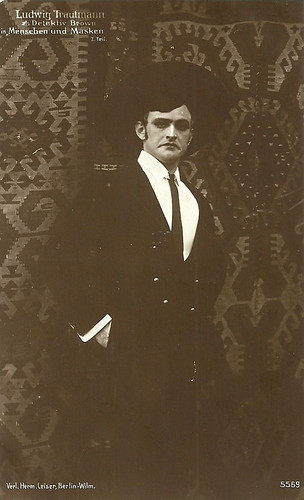
German postcard by Verlag Hermann Leiser, Berlin, no. 5559. Photo: Deutsche Vitascope. Ludwig Trautmann as Detective Kelly Brown in Menschen und Masken, 1. Teil/People and masks, Part 1 (Harry Piel, 1913).

German postcard by Verlag Hermann Leiser, Berlin, no. 5568. Photo: Messter. Ludwig Trautmann as Count Gerhart von Burgsdorff in Das Ende vom Lied(e)/The end of the song (Rudolf Biebrach, 1915), starring Henny Porten.

German postcard by Verlag Hermann Leiser, Berlin, no. 5571. Photo: PAGU / Union Ludwig Trautmann as Felix Merkel in Der Katzensteg/The cat footbridge (Max Mack, 1915), based on the famous novel by Hermann Sudermann, and starring George Lengbach.

German postcard by Verlag Hermann Leiser, Berlin, no. 5572. Photo: Deutsche Vitascope. Ludwig Trautmann as Hans von Eichburg in Das Leben, ein Spiel/Life, a game (N.N., 1913).
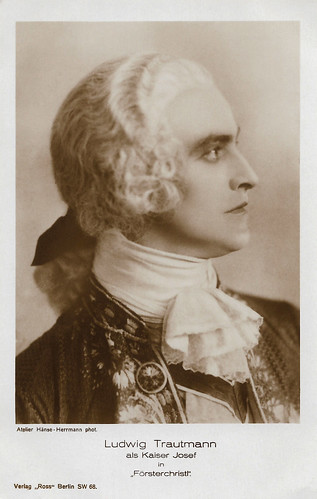
German postcard by Ross Verlag, Berlin. Photo: Atelier Hänse-Hermann. Ludwig Trautmann as the Austrian Emperor Josef II in 'Försterchristl'. There is no German or Austrian film version of this famous operetta by Georg Jarno in which Trautmann acted. So this card may be for a stage version. There was a German silent version of 1926, with Harry Liedtke as the emperor. Who knows Trautmann was last minute replaced by Liedtke?
Ludwig Trautmann was born in Dachsbach, Germany, in 1885. He learned for salesman but in 1901 he made his stage debut. He later worked for theatres in Bochum, Konstanz und Hermannstadt. A cinema owner in Baden-Baden introduced him to film.
In 1912 he signed a contract with the Bioskop-Filmgesellschaft (Bioskop Film Studio). It was the first film contract ever signed in Germany. Trautmann appeared in such short silent films as Madeleine (Emil Albes, 1912) and Die schwarze Natter/The Black Adder (Franz Hofer, 1913).
He soon became known as detective Brown in short silent films directed by Harry Piel, starting with Der Triumph des Todes/The Triumph of Death (Harry Piel, 1912) and Schatten der Nacht/Shadows of the Night (Harry Piel, 1913).
In Austria he played a priest in Der Pfarrer von Kirchfeld/The Priest from Kirchfeld (Jacob Fleck, Luise Fleck, 1914) starring Max Neufeld. He appeared opposite Henny Porten in Gretchen Wendland (Curt A. Stark, 1914), Das Ende vom Liede/The End of the Song (Rudolf Biebrach, 1915) and Die Ehe der Luise Rohrbach/The Marriage of Luise Rohrbach (Rudolf Biebrach, 1917), also with Emil Jannings.
In 1916 he appeared opposite the other superstar of the silent German cinema, Asta Nielsen in Dora Brandes (Magnus Stifter, 1916) and Das Liebes-ABC/The ABC of Love (Magnus Stifter, 1916).
Ludwig Trautmann had become a very successful film actor. He was the darling of the women and at the height of his career, he bought a castle with 22 rooms for the in those days the outrageous sum of DM 480.000.--.
He was in a position to found his own film company, and during World War I, he directed, produced, and wrote several films. Among these films are Das Geheimnis der Villa Dox/The Secret of Villa Dox (Ludwig Trautmann, 1916) and Filmelend: Das Glashausmädchen/Film Misery – The Glass House Girl (Ludwig Trautmann, 1919).
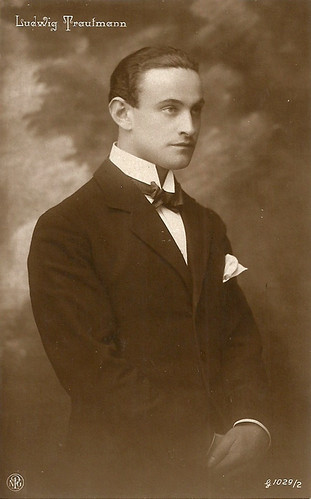
German postcard by NPG (Neue Photographische Gesellschaft), no. G1029/2.

German postcard by NPG (Neue Photographische Gesellschaft), no. G1029/3.
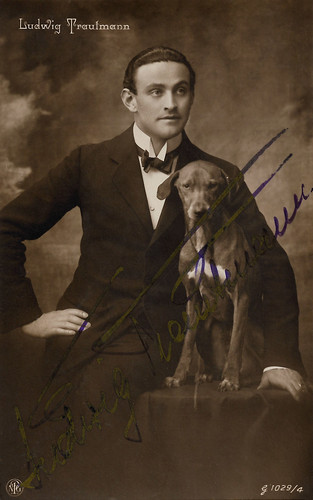
German postcard by NPG (Neue Photographische Gesellschaft), no. G1029/4.

German postcard by NPG (Neue Photographische Gesellschaft), no. G1029/6.

German postcard by Verlag Hermann Leiser, Berlin, no. 5282. Photo: Georg Gerlach.

German postcard by Verlag Hermann Leiser, Berlin, no. 5294. Photo: Georg Gerlach.
Ludwig Trautmann worked in the early 1920s with director Siegfried Dessauer on such films as Frauen…/Women… (Siegfried Dessauer, 1920) and Die goldene Mauer/The Golden Wall (Siegfried Dessauer, 1921) with Mabel May-Yong.
He had a small part in the epic Marie Antoinette - Das Leben einer Königin/Marie Antoinette, the Life of a Queen (Rudolf Meinert, 1922) starring Italian diva Diana Karenne and filmed on location in Paris, but the film offers became scarce.
Between 1925 and 1932 Trautmann did not appear in the cinema, but then he reappeared in supporting roles in films like Die elf Schill'schen Offiziere/The eleven Officers of Major Von Schill (Rudolf Meinert, 1932) with Hertha Thiele, and Trenck - Der Roman einer großen Liebe (Ernst Neubach, Heinz Paul, 1932) starring Hans Stüwe.
He also appeared in the Ufa production Ein Mann will nach Deutschland/A Man Wants to Get to Germany (Paul Wegener, 1934) with Karl Ludwig Diehl and had a bit part in Ein idealer Gatte/An Ideal Husband (Herbert Selpin, 1935) based on the famous play by Oscar Wilde.
Between July and October 1935, Trautmann was imprisoned for homosexual acts. (Homosexual acts between males were a crime at the time in Germany and many other countries. Trautmann was imprisoned because of paragraph 175, a notorious provision of the German Criminal Code dating from 1871. The Nazis broadened the law in 1935; in the prosecutions that followed, thousands died in concentration camps. Between 1871 and 1994 around 140,000 men were convicted under the law).

German postcard by Photochemie, no. K. 1587. Photo: Alex Binder, Berlin.

German postcard by Photochemie, no. K. 1594. Photo: Alex Binder, Berlin.

German postcard by Photochemie, Berlin, no. K. 1595. Photo: Alex Binder, Berlin.

German postcard by Photochemie, Berlin, no. K. 1596. Photo: Alex Binder, Berlin.

German postcard by Photochemie, Berlin, no. K. 1671.
After he was released from prison, Ludwig Trautmann was banned from the Reichstheaterkammer and the Reichsfilmkammer, so it was impossible for him to work as an actor in Nazi-Germany anymore. He left for France, but in 1939 he returned to Germany. In 1940 he was again imprisoned for six months because of his homosexuality.
After the war, Ludwig Trautmann worked for the Volksbühne Berlin. He produced the documentary Eine Fröhliche Fahrt in die Vergangenheit/A cheerful trip in the past (1949). In 1951 he was a member of the jury at the 1st Berlin International Film Festival.
He also played a few more film roles. He had bit parts in the comedies Postlagernd Turteltaube/Poste Restante Turtledove (Gerhard T. Buchholz, 1952), and in Briefträger Müller/Mailman Mueller (Hohn Reinhardt, 1953) starring Heinz Rühmann.
His last film was the DEFA production Robert Mayer - der Arzt aus Heilbronn/Robert Mayer, the Doctor from Heilbronn (Helmut Spiess, 1955).
In 1957 and after a long illness, Ludwig Trautmann died in a hospital in Berlin-Schöneberg. He was 71. His grave in the local cemetery was leveled.

German postcard by Photochemie, no. K. 2169. Photo: Deutsche Mutoskop und Biograph GmbH, Berlin. Ludwig Trautmann and Magda Madeleine in Der Prozess Hauers (Willy Zeyn, 1918).
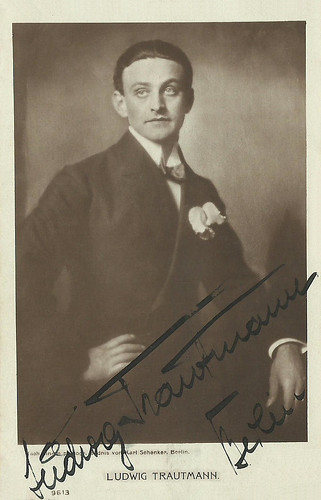
German postcard, no. 9613. Photo: Karl Schenker, Berlin. Collection: Didier Hanson.

German postcard by Ross Verlag, Berlin, no. 1324/1, 1927-1928. Photo: Atelier Mager, Berlin.
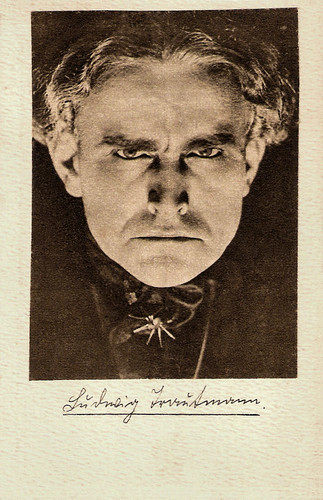
Vintage postcard by FUPRA.

German postcard by Ross Verlag, Berlin, no. 175/3. Photo: Alex Schmoll / FFG. Ludwig Trautmann, Olga Tschechowa and Elga Brink in Der Choral von Leuthen/The Anthem of Leuthen (Carl Froelich, 1933).
Sources: Thomas Staedeli (Cyranos), Filmportal.de, Wikipedia (English and German), and IMDb.
This post was last updated on 8 July 2021.

German postcard in the Moderne Künstler series by MMB, no. 459. Photo: F.J. Wesselsky.

German postcard by Verlag Hermann Leiser, Berlin, no. 5559. Photo: Deutsche Vitascope. Ludwig Trautmann as Detective Kelly Brown in Menschen und Masken, 1. Teil/People and masks, Part 1 (Harry Piel, 1913).

German postcard by Verlag Hermann Leiser, Berlin, no. 5568. Photo: Messter. Ludwig Trautmann as Count Gerhart von Burgsdorff in Das Ende vom Lied(e)/The end of the song (Rudolf Biebrach, 1915), starring Henny Porten.

German postcard by Verlag Hermann Leiser, Berlin, no. 5571. Photo: PAGU / Union Ludwig Trautmann as Felix Merkel in Der Katzensteg/The cat footbridge (Max Mack, 1915), based on the famous novel by Hermann Sudermann, and starring George Lengbach.

German postcard by Verlag Hermann Leiser, Berlin, no. 5572. Photo: Deutsche Vitascope. Ludwig Trautmann as Hans von Eichburg in Das Leben, ein Spiel/Life, a game (N.N., 1913).

German postcard by Ross Verlag, Berlin. Photo: Atelier Hänse-Hermann. Ludwig Trautmann as the Austrian Emperor Josef II in 'Försterchristl'. There is no German or Austrian film version of this famous operetta by Georg Jarno in which Trautmann acted. So this card may be for a stage version. There was a German silent version of 1926, with Harry Liedtke as the emperor. Who knows Trautmann was last minute replaced by Liedtke?
A castle with 22 rooms
Ludwig Trautmann was born in Dachsbach, Germany, in 1885. He learned for salesman but in 1901 he made his stage debut. He later worked for theatres in Bochum, Konstanz und Hermannstadt. A cinema owner in Baden-Baden introduced him to film.
In 1912 he signed a contract with the Bioskop-Filmgesellschaft (Bioskop Film Studio). It was the first film contract ever signed in Germany. Trautmann appeared in such short silent films as Madeleine (Emil Albes, 1912) and Die schwarze Natter/The Black Adder (Franz Hofer, 1913).
He soon became known as detective Brown in short silent films directed by Harry Piel, starting with Der Triumph des Todes/The Triumph of Death (Harry Piel, 1912) and Schatten der Nacht/Shadows of the Night (Harry Piel, 1913).
In Austria he played a priest in Der Pfarrer von Kirchfeld/The Priest from Kirchfeld (Jacob Fleck, Luise Fleck, 1914) starring Max Neufeld. He appeared opposite Henny Porten in Gretchen Wendland (Curt A. Stark, 1914), Das Ende vom Liede/The End of the Song (Rudolf Biebrach, 1915) and Die Ehe der Luise Rohrbach/The Marriage of Luise Rohrbach (Rudolf Biebrach, 1917), also with Emil Jannings.
In 1916 he appeared opposite the other superstar of the silent German cinema, Asta Nielsen in Dora Brandes (Magnus Stifter, 1916) and Das Liebes-ABC/The ABC of Love (Magnus Stifter, 1916).
Ludwig Trautmann had become a very successful film actor. He was the darling of the women and at the height of his career, he bought a castle with 22 rooms for the in those days the outrageous sum of DM 480.000.--.
He was in a position to found his own film company, and during World War I, he directed, produced, and wrote several films. Among these films are Das Geheimnis der Villa Dox/The Secret of Villa Dox (Ludwig Trautmann, 1916) and Filmelend: Das Glashausmädchen/Film Misery – The Glass House Girl (Ludwig Trautmann, 1919).

German postcard by NPG (Neue Photographische Gesellschaft), no. G1029/2.

German postcard by NPG (Neue Photographische Gesellschaft), no. G1029/3.

German postcard by NPG (Neue Photographische Gesellschaft), no. G1029/4.

German postcard by NPG (Neue Photographische Gesellschaft), no. G1029/6.

German postcard by Verlag Hermann Leiser, Berlin, no. 5282. Photo: Georg Gerlach.

German postcard by Verlag Hermann Leiser, Berlin, no. 5294. Photo: Georg Gerlach.
Imprisoned for homosexual acts
Ludwig Trautmann worked in the early 1920s with director Siegfried Dessauer on such films as Frauen…/Women… (Siegfried Dessauer, 1920) and Die goldene Mauer/The Golden Wall (Siegfried Dessauer, 1921) with Mabel May-Yong.
He had a small part in the epic Marie Antoinette - Das Leben einer Königin/Marie Antoinette, the Life of a Queen (Rudolf Meinert, 1922) starring Italian diva Diana Karenne and filmed on location in Paris, but the film offers became scarce.
Between 1925 and 1932 Trautmann did not appear in the cinema, but then he reappeared in supporting roles in films like Die elf Schill'schen Offiziere/The eleven Officers of Major Von Schill (Rudolf Meinert, 1932) with Hertha Thiele, and Trenck - Der Roman einer großen Liebe (Ernst Neubach, Heinz Paul, 1932) starring Hans Stüwe.
He also appeared in the Ufa production Ein Mann will nach Deutschland/A Man Wants to Get to Germany (Paul Wegener, 1934) with Karl Ludwig Diehl and had a bit part in Ein idealer Gatte/An Ideal Husband (Herbert Selpin, 1935) based on the famous play by Oscar Wilde.
Between July and October 1935, Trautmann was imprisoned for homosexual acts. (Homosexual acts between males were a crime at the time in Germany and many other countries. Trautmann was imprisoned because of paragraph 175, a notorious provision of the German Criminal Code dating from 1871. The Nazis broadened the law in 1935; in the prosecutions that followed, thousands died in concentration camps. Between 1871 and 1994 around 140,000 men were convicted under the law).

German postcard by Photochemie, no. K. 1587. Photo: Alex Binder, Berlin.

German postcard by Photochemie, no. K. 1594. Photo: Alex Binder, Berlin.

German postcard by Photochemie, Berlin, no. K. 1595. Photo: Alex Binder, Berlin.

German postcard by Photochemie, Berlin, no. K. 1596. Photo: Alex Binder, Berlin.

German postcard by Photochemie, Berlin, no. K. 1671.
A cheerful trip in the past
After he was released from prison, Ludwig Trautmann was banned from the Reichstheaterkammer and the Reichsfilmkammer, so it was impossible for him to work as an actor in Nazi-Germany anymore. He left for France, but in 1939 he returned to Germany. In 1940 he was again imprisoned for six months because of his homosexuality.
After the war, Ludwig Trautmann worked for the Volksbühne Berlin. He produced the documentary Eine Fröhliche Fahrt in die Vergangenheit/A cheerful trip in the past (1949). In 1951 he was a member of the jury at the 1st Berlin International Film Festival.
He also played a few more film roles. He had bit parts in the comedies Postlagernd Turteltaube/Poste Restante Turtledove (Gerhard T. Buchholz, 1952), and in Briefträger Müller/Mailman Mueller (Hohn Reinhardt, 1953) starring Heinz Rühmann.
His last film was the DEFA production Robert Mayer - der Arzt aus Heilbronn/Robert Mayer, the Doctor from Heilbronn (Helmut Spiess, 1955).
In 1957 and after a long illness, Ludwig Trautmann died in a hospital in Berlin-Schöneberg. He was 71. His grave in the local cemetery was leveled.

German postcard by Photochemie, no. K. 2169. Photo: Deutsche Mutoskop und Biograph GmbH, Berlin. Ludwig Trautmann and Magda Madeleine in Der Prozess Hauers (Willy Zeyn, 1918).

German postcard, no. 9613. Photo: Karl Schenker, Berlin. Collection: Didier Hanson.

German postcard by Ross Verlag, Berlin, no. 1324/1, 1927-1928. Photo: Atelier Mager, Berlin.

Vintage postcard by FUPRA.

German postcard by Ross Verlag, Berlin, no. 175/3. Photo: Alex Schmoll / FFG. Ludwig Trautmann, Olga Tschechowa and Elga Brink in Der Choral von Leuthen/The Anthem of Leuthen (Carl Froelich, 1933).
Sources: Thomas Staedeli (Cyranos), Filmportal.de, Wikipedia (English and German), and IMDb.
This post was last updated on 8 July 2021.
No comments:
Post a Comment